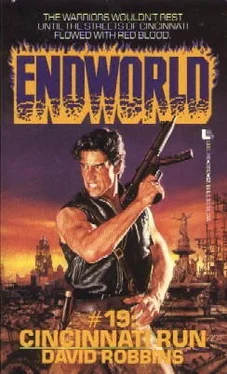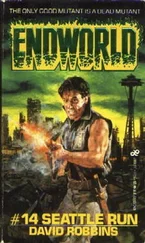David Robbins - Cincinnati Run
Здесь есть возможность читать онлайн «David Robbins - Cincinnati Run» весь текст электронной книги совершенно бесплатно (целиком полную версию без сокращений). В некоторых случаях можно слушать аудио, скачать через торрент в формате fb2 и присутствует краткое содержание. Город: New York, Год выпуска: 1989, ISBN: 1989, Издательство: Leisure Books, Жанр: sf_postapocalyptic, Боевая фантастика, на английском языке. Описание произведения, (предисловие) а так же отзывы посетителей доступны на портале библиотеки ЛибКат.
- Название:Cincinnati Run
- Автор:
- Издательство:Leisure Books
- Жанр:
- Год:1989
- Город:New York
- ISBN:978-0843928921
- Рейтинг книги:3 / 5. Голосов: 1
-
Избранное:Добавить в избранное
- Отзывы:
-
Ваша оценка:
- 60
- 1
- 2
- 3
- 4
- 5
Cincinnati Run: краткое содержание, описание и аннотация
Предлагаем к чтению аннотацию, описание, краткое содержание или предисловие (зависит от того, что написал сам автор книги «Cincinnati Run»). Если вы не нашли необходимую информацию о книге — напишите в комментариях, мы постараемся отыскать её.
Cincinnati Run — читать онлайн бесплатно полную книгу (весь текст) целиком
Ниже представлен текст книги, разбитый по страницам. Система сохранения места последней прочитанной страницы, позволяет с удобством читать онлайн бесплатно книгу «Cincinnati Run», без необходимости каждый раз заново искать на чём Вы остановились. Поставьте закладку, и сможете в любой момент перейти на страницу, на которой закончили чтение.
Интервал:
Закладка:
Blade gazed at the meandering, murky Ohio, and observed a half-dozen boats and one ship, a freighter, plying the waters of the river. According to the Atlas in the SEAL, Cincinnati had served as a transportation hub for the United States prior to the nuclear exchange, and the Soviets were likewise utilizing the city’s unique geographic characteristics wisely. While the Ohio River constituted a natural boundary to the south, two other rivers were also of importance, the Little Miami to the east and the Great Miami to the west. Perhaps, Blade speculated, the city’s prominence as a transportation center accounted for the fact the Russians had not nuked it.
“Are we getting close?” Blade queried impatiently.
“Close,” Fedorov assured him.
Blade twisted in his seat, feeling extremely uncomfortable in the tight-fitting Russian uniform taken from the tallest trooper. The clothes barely fit; the sleeves rode two inches above his wrists, the lower hem of the pants covered the top inch of his combat boots, and the pants threatened to split at the seam with every breath he took. His vest and fatigue pants were bundled under the seat. The Commando rested on his lap, while his Bowies were tucked underneath his shirt, supported by the narrow belt worn by all Soviet troopers. He stared to the west at the setting sun, pleased that twilight was rapidly descending.
“What do you want me to do when we get there?” Fedorov asked.
“Can we drive past the installation without attracting attention?”
“Sure. Delhi Road goes right past the front wall.”
“Then do it.”
Fedorov took a left, then a right, and ultimately turned onto Delhi Road. He flicked on the headlights.
More vehicles were in evidence, dozens of them traveling in both directions. Very few were civilian automobiles.
Hickok leaned forward and placed the AR-15 barrel behind Fedorov’s right ear. “One false move, you coyote, and I’ll ventilate your noggin.”
Fedorov licked his thick lips and wiped the palm of his left hand on his shirt. “What kind of idiot do you take me for?”
“The cream of the crop.”
Fedorov tried to swivel his head to look at the gunman, but the AR-15 barrel jammed into his ear. “I’ve helped you so far.”
“So far,” Hickok conceded.
“Then why not take that gun away from my ear?”
“Can’t. The front sight has grown real attached to your earlobe.”
“You’re weird. Has anyone ever told you that?”
“Practically everyone,” Geronimo chimed in. “But it’s difficult to impress a point on someone who has the cranial capacity of marble.”
“You’re both weird,” Fedorov declared.
Hickok glanced at Geronimo. “Cranial capacity? Have you been readin’ Plato’s books again?”
“I don’t need to read Plato’s books. I can recognize a rock formation when I see one.”
Fedorov cleared his throat and looked at Blade. “Do you mind if I ask you a question?”
“What?”
“Are these two guys always like this?”
Blade nodded.
“I don’t see how you put up with it,” Fedorov commented.
“I look at it as good practice.”
“Practice?”
“I have a three-year-old.”
Fedorov nodded. “I see.”
“I think we’ve just been insulted,” Hickok said.
“I know we’ve just been insulted,” Geronimo amended.
They continued to the west and came to an intersection, crossing Anderson Ferry Road and proceeding another quarter of a mile.
Hickok glanced out his window, his blue eyes widening slightly. “What the dickens is that!” he exclaimed.
“That’s the installation,” Fedorov said.
Blade bent down and stared to the left, marveling at the size of the facility, impressed by the magnitude of every structure. The outer stone walls were 40 feet high and crowned with another six feet of thorny barbed wire. Positioned on the rim of the wall at 20-foot intervals were huge spotlights, all of which were already on. Rearing above the wall on the far side were enormous buildings, architectural behemoths fabricated from stone and glass, startlingly futuristic and incongruous in the otherwise run down and neglected metropolis. The centerpiece of the mysterious installation was a tremendous silver spire capped by a crystal globe 30 feet in diameter. Blade estimated the spire towered 500 feet in the air.
“And you say you don’t know the name of this facility?” Geronimo asked the soldier skeptically.
“I don’t know if it has a name,” Fedorov answered. “Everyone calls it the L.R.F.”
“What does L.R.F. stand for?” Geronimo probed.
“Like I told your leader here, I don’t know.”
“How in the blazes are we going to get in there?” Hickok inquired.
“Sprout wings and fly over the wall?”
“I do know the name of the spire,” Fedorov mentioned.
“You do?” Blade responded. “What is it called?”
“Lenin’s Needle.”
Hickok snorted. “And you call us weird?”
“Hey, I didn’t name the spire. I only know that’s what it’s called,” Fedorov said. “It’s not healthy to go around asking a whole lot of questions about anything, let alone a restricted facility like L.R.F.”
“You must have heard rumors,” Blade commented.
“I heard the place is being used to shoot down planes,” Fedorov said.
“But that’s ridiculous. No one has seen an enemy plane over Cincinnati in ages.” He paused and looked at Lenin’s Needle. “Of course, that might explain the red light…” he began, then stopped as the giant abruptly gripped his right shoulder.
“A red light?” Blade said.
“You’re hurting me,” Fedorov declared, trying to slide his shoulder from under the giant’s brawny hand.
Blade increased the pressure. “What red light are you talking about?”
he queried intensely.
“Every now and then a bright red light shoots out of the spire,” Fedorov explained. “On a clear day or night the light can be seen for miles.”
Blade released his hold and studied Lenin’s Needle, perplexed. What type of weapon could be housed in such an edifice? What was the significance of the crystal globe? For the Soviets to invest such a staggering sum in so mammoth a facility indicated they were supremely confident in the ultimate success of the project—whatever it was.
The jeep was drawing abreast of the front entrance.
“Look at the size of the gate!” Hickok said.
The front entrance to the installation was as impressive as the rest of the engineering. A 30-foot-tall metal gate, latticed with horizontal and vertical bars six inches thick, was the sole means of entry. Two dozens soldiers stood at attention outside the open gate while a pair of officers examined the identification cards of everyone passing inside. A short, wide drive, 20 feet in length, connected Delhi Road to the L.R.F.
Fedorov gazed at the massive portal as he drove. “They keep the gate open during the day, but it’s locked up tight as a drum at night. The day shift is probably heading home, and they’ll be closing the gate soon.”
Blade craned his neck for a glimpse of the interior, but all he could distinguish were the outlines of several of the gigantic structures. The base of the spire, located in the middle of the sprawling compound, was not visible from the road. He pursed his lips, annoyed. Hickok was right. How were they going to get in there? The walls were too high to scale, and even if they could, there was no way they could evade all those spotlights and clamber over the bared wire undetected. Scaling the gate, with so many guards on the premises, was impractical. Clandestine infiltration was their best bet. But how?
They were less than two car lengths to the east of the entrance when an unexpected development provided an unwanted solution to their problem.
Читать дальшеИнтервал:
Закладка:
Похожие книги на «Cincinnati Run»
Представляем Вашему вниманию похожие книги на «Cincinnati Run» списком для выбора. Мы отобрали схожую по названию и смыслу литературу в надежде предоставить читателям больше вариантов отыскать новые, интересные, ещё непрочитанные произведения.
Обсуждение, отзывы о книге «Cincinnati Run» и просто собственные мнения читателей. Оставьте ваши комментарии, напишите, что Вы думаете о произведении, его смысле или главных героях. Укажите что конкретно понравилось, а что нет, и почему Вы так считаете.












